|
After
interviewing a couple of radio personalities, I started to listen
more closely to their different styles. While scanning the AM and
FM stations in Chicagoland, I found myself listening to the new
talk-radio host on WGN who had just moved to Chicago. There was
something about him that made his program and personality a
pleasing listening experience in the afternoon. If you
aren't a regular listener to John Williams in the early
afternoon, this interview will provide you with a good feel for a
genuinely nice guy who is making his mark at the radio station of
his dreams.
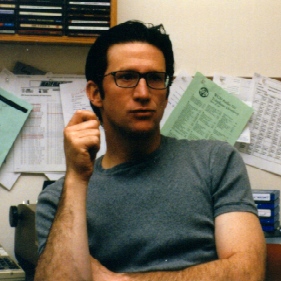 Al: John, you
are one of the newest radio personalities in Chicago. Therefore,
many of my readers don't know a lot about you or your
background. Give me the John Williams life story-in a few
words.
Al: John, you
are one of the newest radio personalities in Chicago. Therefore,
many of my readers don't know a lot about you or your
background. Give me the John Williams life story-in a few
words.
John: I was born in Chicago in 1959:
I'll be 39 in October. My dad was in the Air Force. So I
grew up abroad even though I was born in Chicago. I was in
kindergarten in Germany, first grade in Taiwan, and second
through fifth grade in Hawaii. My dad retired from the service
while we were in Hawaii, and we moved back to Illinois. He
finished his master's degree at Southern Illinois University
in Edwardsville. Then he started his next career as a college
counselor at Joliet Junior College, and we moved up to Joliet, IL
where my family still lives. I went from seventh grade through
junior college there. Then I went to Southern Illinois University
at Carbondale and graduated with a degree in broadcasting.
Al: How did
you get you first job in radio?
John: After
graduation, I hit the bricks like everyone else. I had a hundred
résumés in my hand, sent them to a hundred radio stations, and
got ten responses. Two of which offered minimum-wage jobs. My
first job was in Plano, IL, which is south of Aurora. I was there
for about a year and went to WMBD Peoria for ten years. Then I
moved to Minneapolis for four years at WCCO. After a four-year
stint, I came to WGN here in Chicago.
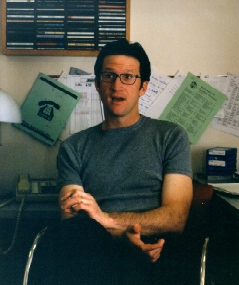 Al: How did
you land the WGN job?
Al: How did
you land the WGN job?
John: I had been trying to get on
here for years-even while I still was in Peoria. I sent my
first demo tape to WGN at least fourteen years ago. While in
Peoria, I had two jobs: one was doing my radio show and the other
was trying to get a radio show somewhere else. It was a monthly
business for me to send out letters, updating résumés, and
doing demo tapes. I was happy in Peoria and had a wonderful job.
I had everything that I could want-except Peoria wasn't
a major market. It was 118th in market
size. While there, I almost got onto radio stations in Miami,
Dallas, and Kansas City. In retrospect, I was good that I
didn't get those other jobs. I think that my show works best
in this part of the country. When I came to Chicago, people would
say, "Wow, you got a job in Chicago!" However, the big
break was getting from Peoria which was 188th
to Minneapolis which is 15th.
It's a
funny story about getting a job in Minneapolis. I interviewed for
a swing-shift kind of job. I'd fill in for the regulars. The
general manager and I shook hands on Friday. I had landed a job
in a big market. On Monday, the general manager quit. So, the
station said let's just wait awhile on my hiring. In a few
weeks, they fired the program director. The station no longer
employed the two people that hired me. The bottom-line was that I
was un-hired and had to stay in Peoria. So, I started all over
again.
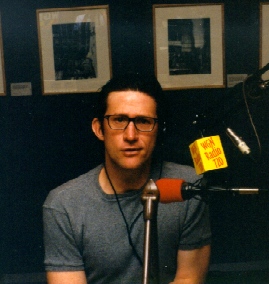 A secretary at the radio station in
Minneapolis remembered my name when the new management finally
got its feet on the ground and started to look for personnel. She
said that I had been hanging around for a long time and was
always writing. It was her suggestion that they give him a
listen. They then hired me-the second time. I left the
interview thinking that I hope they don't quit or get fired.
I moved up to Minneapolis, and in a couple of years, they were
all fired. By that time, I had my foot in the door. The next
management team fortunately liked me, and I survived. Getting and
keeping a job is mostly perseverance.
A secretary at the radio station in
Minneapolis remembered my name when the new management finally
got its feet on the ground and started to look for personnel. She
said that I had been hanging around for a long time and was
always writing. It was her suggestion that they give him a
listen. They then hired me-the second time. I left the
interview thinking that I hope they don't quit or get fired.
I moved up to Minneapolis, and in a couple of years, they were
all fired. By that time, I had my foot in the door. The next
management team fortunately liked me, and I survived. Getting and
keeping a job is mostly perseverance.
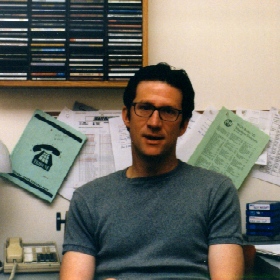 Al: I keep
telling myself that while trying to get my book published and my
column syndicated. It's perseverance. I'm in the
persevering stage now. This will make a good story in a couple of
years when I get to my goals.
Al: I keep
telling myself that while trying to get my book published and my
column syndicated. It's perseverance. I'm in the
persevering stage now. This will make a good story in a couple of
years when I get to my goals.
John: Then you'll like this
story. Yesterday, I talked with Mary Higgins Clark on the show.
She has her new book out for which she was paid $12 million. In
addition, she has a $36 million deal with her publisher. She
likes to tell the story about trying to get her book published.
She said that when she had one story out and publishers were
rejecting it, she was writing the next book-before the first
one was ever accepted. She wasn't discouraged that the first
one was being rejected; she kept on writing. I guess that is what
you have to do. It's what I did. While I had one job, I kept
on working on the next one.
Al: Going back
a moment to your family, where were you in the birth order of
your family?
John:
I'm a middle child and think that explains my personality on
the radio and in life itself. I see myself as a middle child
trying to appease everybody and make everything all right.
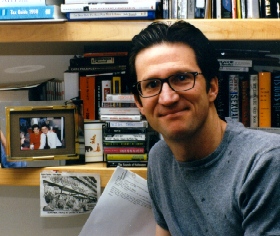 Al: From listening to you, I know that
you are married with children. Al: From listening to you, I know that
you are married with children.
John:
Brenda is my wife. We met down in college at Carbondale. We have
two sons: Grant is nine and Griffin is six.
Al: In most of
my interviews, I ask the question that Gene Siskel always asks
those who he interviews: what is your favorite movie and why?
John:
That's a good question. My producer, Matt, likes to
disparage me by calling me an art-house fairy. In any week, my
wife and I will watch five to ten movies. So, it is hard to pick
just one flic. One movie that comes to mind is Diner.
It is one of the best-written films when it comes to dialogue. I
think that the conversations in the movie are funny, smart, real,
and wry. I can't say that I necessarily identify with any of
the characters, but I appreciate the engaging conversation.
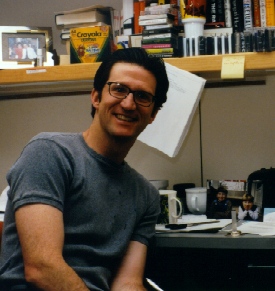 Al: Talk-radio has been hot for ten years. How do you explain this phenomena?
Al: Talk-radio has been hot for ten years. How do you explain this phenomena?
John: In the last ten or fifteen
years talk-radio has come into its own. It has been seen as
either entertainment or information for the masses. WGN is a
hybrid of the two. We used to call it full-service radio.
Nowadays, talk-radio has moved from the old community radio with
receipts and lost pets to much more cutting-edge entertainment.
We do all sorts of things from a parody of Mr. Clinton to your
voice messages segment. Here's a funny story that you will
appreciate-living in Valparaiso. There's a college
football team in Texas that has the longest losing streak in the
nation. They have lost something like seventy-five games in a
row. Last fall, we started calling them after each game. The
coach after one of the losses said, "Listen, we are trying
to get a game going between us and Valparaiso University. Do you
think that you could help us raise the money to bring our team up
to Valparaiso?" He was serious about playing VU thinking
that they could beat them. The audience thought that it would be
a good match between the two team because Valpo's football
team wasn't that good either.
But, no one came up with the money
necessary to pull this off. Nonetheless, this was a good story
and the audience got involved in it the entire football season.
However, I haven't seen any money pouring in to bring the
team up here to Indiana.
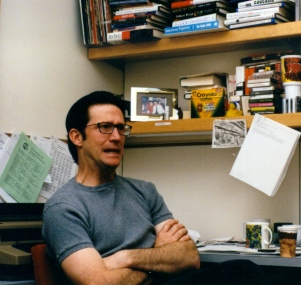 Al: Aside from
the audience not coming up with the bucks for transportation
costs, what is the need that talk-radio answers for the listener?
What does it say about isolation or estrangement?
Al: Aside from
the audience not coming up with the bucks for transportation
costs, what is the need that talk-radio answers for the listener?
What does it say about isolation or estrangement?
John: I
think that it has a lot to do with staying connected. Look at
that computer over there. I don't think that the computer is
about isolation as much as it is our desire to stay connected. We
have beepers, pagers, answering machines, cellular phones, and
the list goes on. We have created a culture of people who get
nervous if things are going around them about which they
aren't aware. I think that is where talk-radio comes into
play. It is another means to stay connected with what is
happening right now. While it is entertaining, it also provides a
means to be on top of everything as it is happening.
Al: I have
been intrigued by your ability to engage the listeners in a
didactic dialogue. Your discussions with your callers seem like
they are an educational process. You state a position, they state
their opinion, and then the two of you test out new or different
ways of looking at the question. Many talk-radio show hosts
merely defend their position. Callers either agree or disagree,
but the host isn't influenced by the callers' opinions.
You want the dialogue and are willing to change your opinion if
the caller makes a convincing argument. Is this an intentional
style?
John: It is
intentional in the sense that I don't consider myself an
expert in very much. Therefore, the dialogue is my attempt to
understand more fully. In addition, I am terrifically curious.
I'm absolutely interested in finding out what the truth is
and become very zealous in that pursuit.
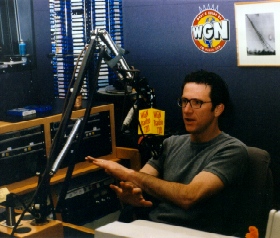 Al: You are zealous in that pursuit but not in pushing your opinion.
Al: You are zealous in that pursuit but not in pushing your opinion.
John: Absolutely, it goes back to my
feeling that I don't have all the answers. I am always going
to listen to differing opinions because you may be a lot closer
to the truth than I am. I am disappointed by the arrogance of
some talk-radio hosts who say it is this way, and my way is the
only way. I want to ask them, "What makes you so
smart-except that you have the microphone? This guy who will
get one minute on your show might be correct."
You know who
can tell who is correct? The audience. The host may still be
pounding the table and restating his opinion long after the
caller has hung up. However, the audience knows who is correct.
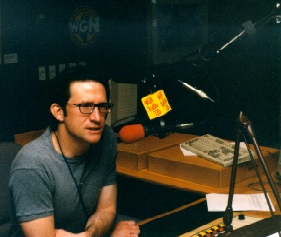 Al: What's your professional future as a radio host?
Al: What's your professional future as a radio host?
John: I never wanted to get into TV
and don't necessarily aspire for syndication. I am such a
product of this local market. I listened to this station in high
school and have always desired to host a talk show here at WGN. I
would like to retire in this office twenty years from now. You
can come back then, and we can talk about the last twenty years.
I don't want to go to New York nor do I want to go back to
Peoria. The challenge will be not to get stale.
Al: You have
an on-the-air candor that you don't find with many
talk-radio hosts. When you first came to town, you talked about
being nervous about being the new kid on the block. You readily
expressed your feelings of vulnerability.
John: That
was true. Those first few weeks were the most insecure time for
me. I don't know why is was. Minneapolis was a big city
market. Many a time, candor was about all that I had going for
me. Maybe the stakes were higher or maybe my dream had come true
and had to prove myself all over again. I don't really know,
but it wasn't a fun time for me.
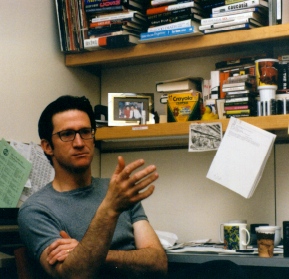 Al: Your openness and honesty comes through loud and clear. It is a
pleasant change from many of your talk-radio peers. You seem to
be able to open yourself emotionally.
Al: Your openness and honesty comes through loud and clear. It is a
pleasant change from many of your talk-radio peers. You seem to
be able to open yourself emotionally.
John: Well, to some extent
that's true, but I was talking with Bob Collins the other
day about this very thing. He said that it is easier sometimes to
be honest to the radio audience than it is to be honest to
friends and family. I agreed with him totally. I often wish that
my wife, Brenda were listening when I am saying something to
millions. She could glean from my comments something that I
couldn't easily say to her. Maybe it is because they
aren't sitting in front of you, or maybe it is because
I'm putting it into a larger context-it distances me
from the emotions and intimacy.
Al: When you
retire and leave the mic for the last time, how do you want your
epitaph read? How do you want to be remembered?
John: At my age, I don't think
much about that. You know, there are two things that the best
talk show hosts do well. The person needs to be genuinely curious
and interested in a lot of different subjects. In addition, that
person should be a skilled listener. We all need to become better
at listening as husbands, wives, children, and others.
I would want
my epitaph to read: "He listened." You could write of
any talk radio host: "He talked." But what I really try
to do is to listen. I'll get my time to talk; the hard part
is to listen. It is like spouses who say you are hearing me but
not listening. I think the best talkers are the best listeners. I
think the best parents are the best listeners. So, put on my
epitaph: "He listened."
Al: I know
that you have to get on the air in just as few moments. Could I
get some pictures of you in the studio doing your thing?
John: Sure,
let's head down to Studio A-. On the way, we will be going
past the WGN Shrine-Wally Phillips' office. He still
maintains an office here, but he hasn't been on the air for
sometime now. But he built this place. So I think that it is
fitting to bow as we pass his office.
|







 Al: John, you
are one of the newest radio personalities in Chicago. Therefore,
many of my readers don't know a lot about you or your
background. Give me the John Williams life story-in a few
words.
Al: John, you
are one of the newest radio personalities in Chicago. Therefore,
many of my readers don't know a lot about you or your
background. Give me the John Williams life story-in a few
words. Al: How did
you land the WGN job?
Al: How did
you land the WGN job? A secretary at the radio station in
Minneapolis remembered my name when the new management finally
got its feet on the ground and started to look for personnel. She
said that I had been hanging around for a long time and was
always writing. It was her suggestion that they give him a
listen. They then hired me-the second time. I left the
interview thinking that I hope they don't quit or get fired.
I moved up to Minneapolis, and in a couple of years, they were
all fired. By that time, I had my foot in the door. The next
management team fortunately liked me, and I survived. Getting and
keeping a job is mostly perseverance.
A secretary at the radio station in
Minneapolis remembered my name when the new management finally
got its feet on the ground and started to look for personnel. She
said that I had been hanging around for a long time and was
always writing. It was her suggestion that they give him a
listen. They then hired me-the second time. I left the
interview thinking that I hope they don't quit or get fired.
I moved up to Minneapolis, and in a couple of years, they were
all fired. By that time, I had my foot in the door. The next
management team fortunately liked me, and I survived. Getting and
keeping a job is mostly perseverance. Al: I keep
telling myself that while trying to get my book published and my
column syndicated. It's perseverance. I'm in the
persevering stage now. This will make a good story in a couple of
years when I get to my goals.
Al: I keep
telling myself that while trying to get my book published and my
column syndicated. It's perseverance. I'm in the
persevering stage now. This will make a good story in a couple of
years when I get to my goals.
 Al: From listening to you, I know that
you are married with children.
Al: From listening to you, I know that
you are married with children. Al: Talk-radio has been hot for ten years. How do you explain this phenomena?
Al: Talk-radio has been hot for ten years. How do you explain this phenomena? Al: Aside from
the audience not coming up with the bucks for transportation
costs, what is the need that talk-radio answers for the listener?
What does it say about isolation or estrangement?
Al: Aside from
the audience not coming up with the bucks for transportation
costs, what is the need that talk-radio answers for the listener?
What does it say about isolation or estrangement?  Al: You are zealous in that pursuit but not in pushing your opinion.
Al: You are zealous in that pursuit but not in pushing your opinion. Al: What's your professional future as a radio host?
Al: What's your professional future as a radio host? Al: Your openness and honesty comes through loud and clear. It is a
pleasant change from many of your talk-radio peers. You seem to
be able to open yourself emotionally.
Al: Your openness and honesty comes through loud and clear. It is a
pleasant change from many of your talk-radio peers. You seem to
be able to open yourself emotionally.